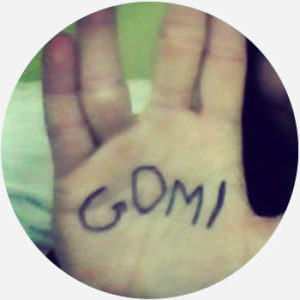Acronyms dictionary
GOMI
[jee-oh-em-ahy] or [goh-mee]
What does GOMI mean?
An acronym for “Get Off My Internets,” GOMI is a blog and message board notorious for its sharp and often cruel criticism of lifestyle bloggers.
Where does GOMI come from?

Brooklyn-based blogger and software developer Alice Wright founded GOMI (gomiblog.com) in 2008 as a snarky internet community where she could “shit-talk new media and internet personalities.” The name comes from the expression Get off my internet!, often used in humorous plural as Get off my internets!, issued online to users deemed obnoxious or amateurish. Urban Dictionary enters Get off my internet in 2005, and Get off my internets appears on message boards as early as 2006.
Its users, predominantly women and who call themselves “hamcats,” often target blogs and websites focused on parenting, traveling, fashion, crafting, and healthy living, which mushroomed in the late 2000s. Their criticisms have piled on uncalled-for personal insults of well-meaning, unsuspecting bloggers.
Obsessed with the GOMI forums. So much hilarious hate!
— Amie W (@rabblearouser) March 14, 2014
GOMI only had a small presence online until it gained notoriety after popular “mommy blogger” Heather Armstrong (Dooce) mounted legal challenges on the website for gossiping about her divorce in 2012. GOMI sparked another controversy in 2015 when it accused lifestyle blogger Emily Meyers’s husband of faking cancer.
@themegaleg Ahhh I love GOMI!! Mags is engaged again, Dooce is dating this dude with a big schnoz, Suburban Bliss is long divorced and …
— Megan (@MissMeggit) September 3, 2014
Owing to incidents like these, GOMI has been decried as a “forum for grown-up mean girls” and a “hate blog,” with Alice Wright herself called “the most reviled woman on the web.” Some bloggers have said that GOMI attacks drove them to take antidepressant medications, caused legal hardships, or led to intense privacy invasions.
#GOMI: "Get Off My Internets" The cruel site for #female snark https://t.co/HXhi2SQb35 #cyberbullying #bullying pic.twitter.com/iPHnliurjQ
— Sue Scheff (@SueScheff) January 22, 2016
Still, Forbes online listed GOMI as one of their “100 Best Websites For Women” in 2013. Some bloggers take it as a sign they’ve “made it” when they’re featured on GOMI.
Examples of GOMI
Who uses GOMI?
The acronym GOMI tends to specifically refer to the blog, while Get off my internet(s)! enjoys broader and general use online as dismissive phrase. GOMI features a spinoff acronym, SOMI, or “Stay on My Internet,” for blogs, websites, and internet celebrities GOMI users find worthwhile.
SOMI health/fitness/weight loss blogs | Stay On My Internets | GOMI …: Hello! Looking for any good blogs on … http://t.co/Hbk2sEDC6x
— janice davis (@janicedavis26) May 1, 2013
Reading #GOMI forums on healthy living blogs…you have to weed through the clearly-unhappy-about-life people, but there's some good points.
— A R DeWitt 😘 (@amandaRdewitt) December 5, 2011
@stephs1120 SO agree with you on reading the gomi forums… I just find them so interesting! Can't look away.
— Jess | Parenting + Lifestyle (@BeingMrsBeer) February 24, 2016
GOMI is not to be confused with the Japanese surname Gomi or the Marvel Comics character Gomi.
Note
This is not meant to be a formal definition of GOMI like most terms we define on Dictionary.com, but is rather an informal word summary that hopefully touches upon the key aspects of the meaning and usage of GOMI that will help our users expand their word mastery.